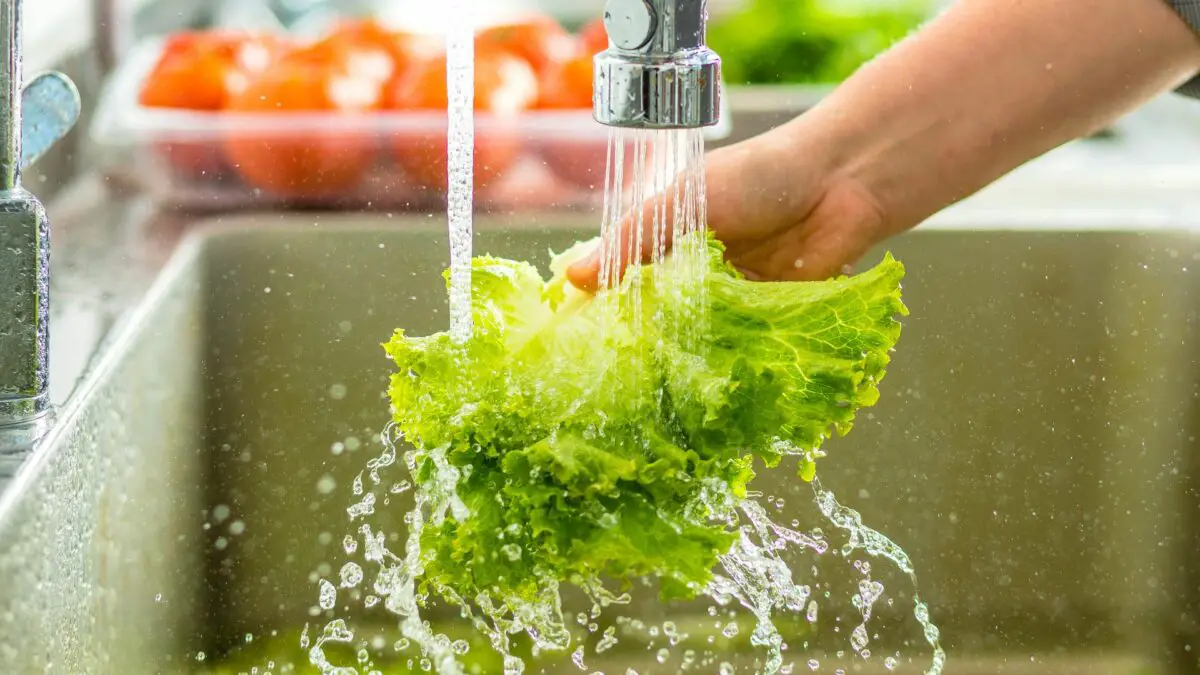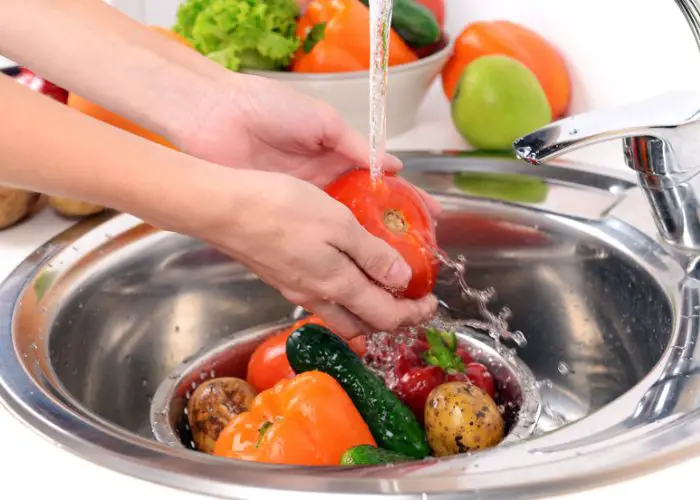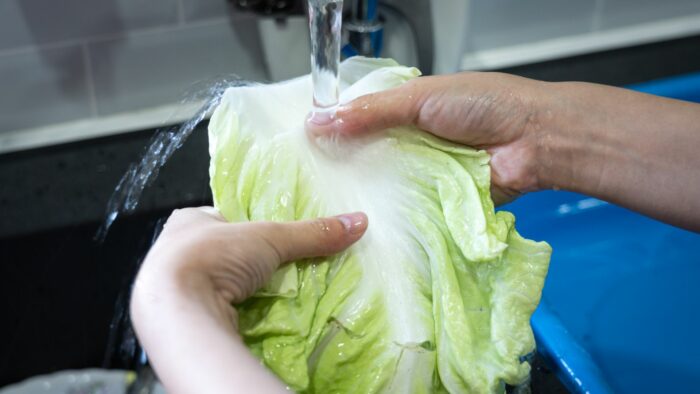Last Updated on March 2, 2023 by Griselda M.
It is essential to know how to wash neem oil off vegetables before consumption. Neem oil is a moderately toxic oil that inhibits spoilage organisms on fruit and vegetables. As with any treated foodstuff, it is best to remove the neem oil before consuming the vegetable. Let’s take a look at a few simple, water-efficient ways to remove the majority of neem oil residues from our foods.
Is Neem Oil Safe Off Vegetables?
Neem oil can be used on most kinds of plants, and it is nearly completely safe for humans at low concentrations. Do not go and drink a bottle of it – it will kill you. Neem oil is commonly used as a more natural way of controlling insects and mites on plants. Many commercial formulations are readily available.
It is also quite common to use neem oil on the houseplants in your home.
Is Neem Oil Safe For a Human to Eat?
Neem oil is extracted from the Neem tree (Azadirachta indica). It is a natural herb that is commonly found in India. It has been used as a remedy since ancient times. As with most traditional medicines, recent research has focussed on the mode of action and effectiveness of neem for treating many issues. In India, neem concoctions are popular remedies for curing colds, flu, bronchitis, stomach ulcers, and sore throats.
Many studies have shown that the extract from the leaves of the neem tree (Azadirachta indica) is highly effective against many diseases and infections. It is of interesting in treating malaria, dysentery, and even the common flu.
Is Neem Oil Poisonous to Humans?
The main active ingredient in neem is Azadirachtin which is toxic to humans in large doses. Neem oil is a potent home remedy for various ailments, but some people are concerned about its toxicity level. In many cases with medicinal substances, there is a level below which substances are beneficial and above which they are toxic. Neem oil has quite a large range between its beneficial and toxic levels, making it relatively safe.
Neem oil is considered generally safe to use as a topical treatment because it contains an extract of neem, which is non-toxic and free of side effects. Neem oil is used to treat skin problems, acne, rashes, athlete’s foot, and even eczema.
Again, common sense should prevail, however – we apply neem to vegetables to kill insects. Then we eat vegetables. If you wish to medicate yourself with neem, consuming neem oil-covered vegetables is not the appropriate method as the doses are unpredictable. In this regard, it makes sense to wash your vegetables to reduce the risk of accidentally consuming a blob of oil.
Learn more about Copper Fungicide Vs Neem Oil: Let’s Compare
How to Wash Neem Oil From Your Vegetables?
As a general rule, if vegetables have been treated with any sprays it is a good idea to wash them. I generally believe in rinsing vegetables that I buy from a shop with a mixture of 1 teaspoon of dishwashing liquid in a gallon of warm water. Run a cloth over the surface of your vegetables and fruit and then rinse them with clean water. The soap helps to remove residues and the freshwater helps remove the soap.
This is one of the main reasons I grow my own vegetables – I know I put nothing into the vegetables and hence I can eat my food without fear! Shop vegetables are another story.
How Long After Spraying Neem Oil Can You Eat Vegetables?
So, how long after spraying neem oil can you eat vegetables? You should first understand that you can harvest vegetables about 24 hours after the neem oil application. However, consuming them would require a longer time because of the toxicity in the oil. Although they can be harvested early, you should wait at least five days before eating them.
Keep in mind that your crop would need to be thoroughly washed with soapy water to get rid of any trace of neem oil before consumption. This is because neem oil takes some time to break down completely. It is for this reason that careful care is required after the application of neem oil on vegetable plants and before it is safe to eat.
Ensuring that all traces of topical treatment are no longer present would be your responsibility as the harvester. However, products like Monterey Neem Oil are deemed safe when used on crops, allowing you to eat the vegetables right away after harvesting and washing them thoroughly.
Is Neem Oil Poisonous to Humans?
As gardening enthusiasts, we are often asked, is neem oil poisonous to humans? Firstly, although it can be, neem oil poisoning in adults rarely occurs. But, this does not mean that it cannot cause poisoning because there have been reports where patients suffered symptoms that included toxic encephalopathy, seizures, vomiting, and metabolic acidosis in some instances.
However, in a case like this, systematic treatments usually result in a full recovery. You should also remember that neem oil poisoning does not take long to manifest itself. The effects of it can be seen in just a few minutes and sometimes a couple of hours, as reports have shown.
Cold-pressed neem oil, on the other hand, poses no risk to human health because it has minimal toxicity levels no matter the exposure. This type of substance is effective in controlling the invasion of plant insects and some diseases.
How to Use Neem Oil on Vegetable Plants?
It is essential to understand how to use neem oil on vegetable plants. This is because this effective oil is quite useful in reducing pest infections that can flaw your crop. You can also use the oil as a preventative measure if you know about applying it correctly. Listed below are a few tips and benefits to keep in mind when applying neem oil to your vegetable plants.
Neem oil application tips and benefits:
- Neem oil works best if it is applied to your crop in the early morning or late evening hours.
- Using neem oil when the sun is striking is not advised. This is because any application that is exposed to the harsh rays of sunlight will flaw your vegetable plants and cause them to burn.
- The effects of neem oil applications on vegetable plants can be seen throughout the growing season. This is because it is effective enough to rid of pests at every stage of their growth cycle. It doesn’t matter if it’s larvae, eggs, pupas, or fully grown pests, as you can rely on neem oil to eliminate them at any stage.
- Aphids, whiteflies, mealybugs, leafhoppers, Japanese beetles, fungus gnats, thrips, and other insects are easily killed when an application of neem oil.
- Applying neem oil directly to your vegetable plants will also get rid of fungal diseases that include leaf spots, powdery mildew, anthracnose, and scab.
- Beneficial insects that do not falw your vegetable plant leaves are safe from the effects of neem oil. These include earthworms, ladybugs, and pollinators.
How to Use Neem Oil on Plants
Let’s discuss how to use neem oil on plants. This is important as the incorrect application at the wrong time can have damaging results for your vegetable plants. Therefore, to acquire an abundant healthy yield, applying neem oil on plants the right way is advised. You can opt to fulfill your organic garden needs by making your own DIY neem oil spray, or you can make use of readymade neem oil insecticides that are easily available. Follow the steps below to acquire favorable results.
Neem oil application for vegetable plants:
- You will need a foliar spray bottle, cold-pressed neem oil, about a gallon or so of warm water, and dish or insecticidal soap.
- Next, mix a teaspoon of the soap and the water. Keep in mind that the purpose of the liquid soap is to serve as an emulsifier for the mixture.
- Then, you can add a tablespoon or two of neem oil to the water and soap mixture.
- You can now fill the neem oil mixture into the spray bottle and apply it to a small area of your vegetable plant. Check that section after 24 hours to see if the application caused any damage. If all is well, thoroughly spray the leaves of your plants by misting them.
- Applying the neem oil mixture biweekly is recommended as a preventative measure against diseases and pests. if you find that your plant is already invaded by insects or shows symptoms of disease, a weekly spray of neem oil would be best to get rid of them.
Final Words: How to Wash Neem Oil Off Vegetables Without Wasting Time Or Water!
In conclusion, I hope you enjoyed this article about how to wash neem oil off vegetables. One of the benefits of washing neem oil off vegetables is it helps to remove pesticides and fertilizers. I have seen many “organic” farmers who secretly spray their crops with things far nastier than neem. The only person you can trust to grow healthy food for you – is you!
FAQs
Does neem oil need to be rinsed off?
You will probably not be able to ingest enough neem oil from a treated vegetable to do yourself any harm, but just in case some wombat brained moron sprayed a plant with a badly mixed neem concoction it is a good idea to wash your veggies. People are also quite untrustworthy - often "organic" farmers sneak a little pesticide in here and there. Rinse your veggies if you did not grow them yourself and do not know what is on them.
Can you eat veggies sprayed with neem oil?
Yes, but rinse them first. Neem is "relatively" non toxic to humans. It is however inadvisable to consume a lot of it.
How do you remove neem oil?
Rinse your vegetables in a mixture of 1 teaspoon of dishwashing liquid soap in a gallon of warm water. After rinsing the vegetables, rinse them with fresh water to remove the soap residues. Consume the vegetables soon after this.
What happens if you accidentally ingest neem oil?
A little bit on a plant will not hurt you. However, if you for some bizarre reason took a drink of a neem oil preparation, it is probably best to take the bottle and yourself to the emergency room at a hospital and get treated as per the guidelines for accidental exposure listed on the bottle. Just show the ER room doctor the bottle. They are trained to know what to do.
Read more about Does Neem Oil Kill Ants? – A Deeper Research
Branko is the world‘s most enthusiastic gardener! He is always on the hunt for the perfect flower, bush or tree to add to his ever–growing garden. He is known for his love of all things green, and his passion for nurturing the plants he grows is unmatched. He loves to get his hands dirty and can often be found humbly tending to his garden at all hours of the day. Branko is the go–to guy when it comes to gardening advice – he is always happy to share his knowledge and wisdom with anyone who will listen. He also loves to play pranks on unsuspecting visitors, so beware if you enter his garden!



